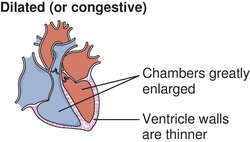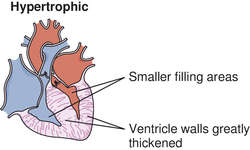Medical term:
CMP
CMP
CMP
Abbreviation for:cardiomyopathy
cartilage matrix protein
caudal mesenteric plexus
cell membrane protein
chondrocyte metalloprotease
chronic marginal periodontitis
civil monetary penalty
Civilian Medical Practitioner (Medspeak-UK)
competitive medical plan
comprehensive metabolic panel
cow milk protein
cytidine monophosphate
cytosine monophosphate
CMP
cardiomyopathy
(kard?e-o-mi-op'a-the) [ cardio- + myopathy],CMP
alcoholic cardiomyopathy
arrhythmogenic right ventricular cardiomyopathy
Abbreviation: ARVCArrhythmogenic right ventricular dysplasia.
congestive cardiomyopathy
constrictive cardiomyopathy
Restrictive cardiomyopathy.eosinophilic cardiomyopathy
Löffler endocarditis.



hypertrophic cardiomyopathy
Abbreviation: HCMSymptoms and Signs
Although patients may be asymptomatic for many years, they commonly report shortness of breath (particularly on exertion), fatigue, atypical chest pain (at rest and after meals), orthopnea, dizziness, and other symptoms of congestive heart failure after the heart muscle markedly enlarges. An S4 and a harsh crescendo-decrescendo systolic murmur, best heard at the left lower sternal border, may be present. Ventricular arrhythmias are common and may result in palpitations, syncope, or sudden death.
Treatment
Drug therapies include beta blocking and calcium channel blocking drugs (such as verapamil) to slow heart rate, control arrhythmias, and reduce myocardial oxygen demand. Anticoagulants and antiarrhythmic agents are also occasionally used. For patients with marked enlargement of the ventricular septum and high outflow tract pressure gradients (> 50 mm Hg), surgical removal of the enlarged muscle or ablation often produces favorable improvements in exercise tolerance and breathing.
Patient care
Strenuous physical exercise should be discouraged because it may produce breathlessness, presyncope, or frank loss of consciousness. If applicable, the patient should be encouraged to lose weight, stop smoking, and limit alcohol intake. An implanted cardioverter/defibrillator (ICD) may be required. The patient should be advised to report symptoms of chest pain, prolonged dyspnea, or syncope promptly. First-degree relatives of those affected should be referred for evaluation.
idiopathic dilated cardiomyopathy
Abbreviation: IDCTreatment
General supportive therapy includes rest, weight control, abstinence from tobacco, and moderate exercise at a level that does not cause symptoms. A salt-restricted diet is recommended. Therapy includes the use of vasodilators, such as ACE inhibitors, and diuretics like furosemide. Anticoagulants are important to prevent thrombus formation. IDC is a principal indication for cardiac transplant.
cardiomyopathy of overload
peripartum cardiomyopathy
primary cardiomyopathy
restrictive cardiomyopathy
secondary cardiomyopathy
stress-induced cardiomyopathy
Takotsubo cardiomyopathy.tachycardia-induced cardiomyopathy
takotsubo cardiomyopathy
comprehensive metabolic panel
,CMP
Latest Searches:
vasohypertonic - vasography - vasogenic - vasoganglion - vasoformative - vasoformation - Vasoflux - Vasofem - vasofactive - vasoepididymostomy - vasoepididymography - vasodilatory - vasodilator - vasodilative - vasodilation - vasodilating - vasodilate - vasodilatation - Vasodilan - vasodepression -
- Service manuals - MBI Corp